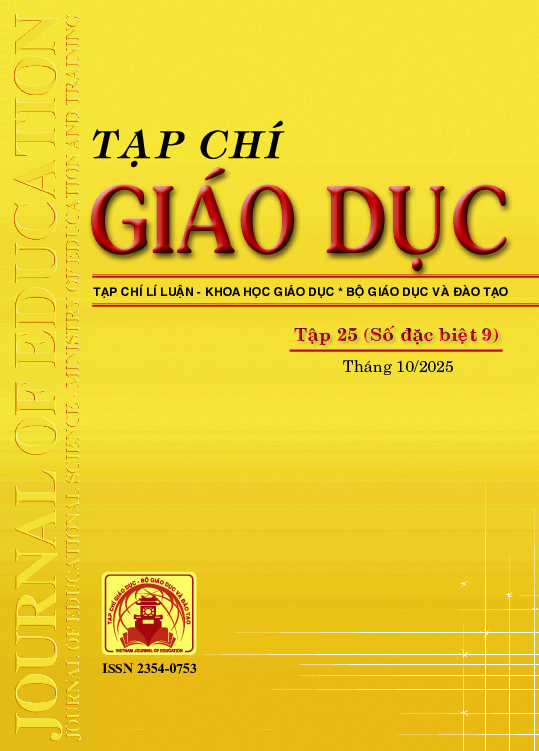Phát triển năng lực số cho cán bộ quản lí trường phổ thông trong bối cảnh chuyển đổi số: cơ sở lí luận và đề xuất định hướng
Tóm tắt
In the context of the Fourth Industrial Revolution and digital transformation in education, enhancing digital competence for school leaders in general education has become an essential requirement. This article presents theoretical perspectives on the structure of digital competence for educational managers, the specific requirements for such competence, and the management content for developing this competence among school leaders to meet the current demands of educational digital transformation. Based on this analysis, the study proposes key directions for developing digital competence among school leaders: improving policies and competence frameworks, strengthening professional development, investing in infrastructure, mobilizing resources, building professional learning communities, and integrating digital competence criteria into evaluation and appointment processes. The findings highlight the crucial role of digital competence in educational management. The proposed solutions serve as a foundation for future research on implementation models and the assessment of their effectiveness in practice.
Tài liệu tham khảo
Al Nuaimi, H., Ahmad, S. Z., & Khalid, K. (2024). The importance of the school principals’ role in the digital transformation of the education sector. International Journal of Comparative Education and Development, 26(1), 17-37. https://doi.org/10.1108/IJCED-05-2023-0044
Bộ GD-ĐT (2024). Quyết định số 3806/QĐ-BGDĐT ngày 29/11/2024 Ban hành Bộ chỉ số đánh giá mức độ chuyển đổi số đối với cơ sở giáo dục và đào tạo, Phòng giáo dục và đào tạo.
Bộ GD-ĐT (2025). Thông tư số 02/2025/TT-BGDĐT ngày 24/01/2025 Quy định khung năng lực số cho người học.
European Commission (2019). Key competences for lifelong learning. http://doi.org.10.2766/291008
Ghamrawi, N., Shal, T., & Ghamrawi, N.A.R. (2024). Leadership development in virtual communities of practice: The case of school principals from the GCC Region. Educ Inf Technol, 29, 23897-23916. https://doi.org/10.1007/s10639-024-12784-y
Global Partnership for Education (2024). Making technology work for education transformation goals: A partnership approach for action (p. 27). Global Partnership for Education.
ISTE-A (International Society for Technology in Education Standards for Administrators) (2009). ISTE standards for administrators. https://cdn.iste.org/wwwroot/Libraries/Images/Standards/Download/ISTE%20Standards%20for%20Administrators%2C%202009%20(Permitted%20Educational%20Use).pdf
Karakose, T., Polat, H., Tülübaş, T., & Demirkol, M. (2024). A Review of the Conceptual Structure and Evolution of Digital Leadership Research in Education. Education Sciences, 14(11), 1166. https://doi.org/10.3390/educsci14111166
Kirinić, V., Hutinski, Ž., Mekovec, R., Žajdela Hrustek, N., Jugo, G., Dejanović, L., Bilić Meštrić, K., Tingle, J., & Maravić, J. (2022). Framework for the digital competence of school principals. Croatian Academic and Research Network - CARNET. https://www.cedefop.europa.eu/files/framework-for-the-digital-competence-of-school-principals.pdf
OECD (2023). OECD Digital Education Outlook 2023: Towards an Effective Digital Education Ecosystem. OECD Publishing, Paris. https://doi.org/10.1787/c74f03de-en
Okunlola, J. O., & Naicker, S. R. (2025). Principals’ Digital Leadership Competencies in the Fourth Industrial Revolution: Teachers’ Perspectives. Education Sciences, 15(6), 656. https://doi.org/10.3390/educsci15060656
Phạm Minh Giản, Nguyễn Thị Tuyết Hạnh (2019). Phát triển đội ngũ cán bộ quản lí trường trung học phổ thông theo chuẩn hiệu trưởng đáp ứng yêu cầu đổi mới giáo dục. Tạp chí Khoa học Đại học Đồng Tháp, 37, 3-9. https://doi.org/10.52714/dthu.37.4.2019.674
Reis-Andersson, J. (2024). Leaders’ perceptions of digitalisation in K–12 education: influencing arrangements for leading the expansion of digital technologies. Discov Educ, 3(143). https://doi.org/10.1007/s44217-024-00247-y
Thủ tướng Chính phủ (2022). Quyết định 131/QĐ-TTg ngày 25/01/2022 phê duyệt Đề án Tăng cường ứng dụng công nghệ thông tin và chuyển đổi số trong giáo dục và đào tạo giai đoạn 2022-2025, định hướng 2030.
UNESCO (2018). ICT Competency Framework for Teachers. UNESCO Publishing. https://unesdoc.unesco.org/ark:/48223/pf0000265721
Woodhouse, H., Passey, D., & Anderson, J. (2024). Using Digital Technologies to Build Connections between Families and Schools as Children Transition to School. Education Sciences, 14(5), 520. https://doi.org/10.3390/educsci14050520
Đã Xuất bản
Cách trích dẫn
Số
Chuyên mục
Giấy phép

Tác phẩm này được cấp phép theo Ghi nhận tác giả của Creative Commons Giấy phép quốc tế 4.0 .












